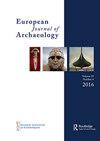Maritime Archaeological Research, Sustainability, and Climate Resilience
IF 1.4
2区 历史学
0 ARCHAEOLOGY
引用次数: 1
Abstract
Maritime archaeology has been identified as a significant field among the humanities that could contribute to the global sustainable development agenda. This article explores the relevance of maritime archaeological studies to initiatives of climate action. Βy reviewing the contributions of various state-of-the-art projects and by linking their aims and outcomes to specific targets of the UN Sustainable Development Goals, the author highlights the benefits of involving maritime archaeological research in the pursuit of sustainability and climate resilience. This involvement could play a key role in reinforcing human-centred and culturally aware solutions to the current climate change effects that threaten human populations, especially in maritime regions. It is hoped that this discussion will inspire researchers in the humanities, archaeology, and maritime archaeology in particular, to use their expertise within the framework provided by the sustainable development agenda to help build a better future.海洋考古研究、可持续性和气候适应性
海洋考古学已被确定为人文学科中的一个重要领域,可以为全球可持续发展议程做出贡献。本文探讨了海洋考古研究与气候行动倡议的相关性。Βy回顾了各种最先进项目的贡献,并将其目标和成果与联合国可持续发展目标的具体目标联系起来,作者强调了将海洋考古研究纳入追求可持续性和气候适应能力的好处。这种参与可以在加强以人为本和具有文化意识的解决方案方面发挥关键作用,以解决当前威胁人口的气候变化影响,特别是在海洋地区。希望这次讨论能够激励人文、考古学、特别是海洋考古学的研究人员,在可持续发展议程提供的框架内运用他们的专业知识,帮助建设一个更美好的未来。
本文章由计算机程序翻译,如有差异,请以英文原文为准。
求助全文
约1分钟内获得全文
求助全文
来源期刊

European Journal of Archaeology
ARCHAEOLOGY-
CiteScore
3.40
自引率
6.70%
发文量
58
期刊介绍:
The publication organ of the European Association of Archaeologists, the European Journal of Archaeology seeks to promote open debate amongst archaeologists committed to a new idea of Europe in which there is more communication across national frontiers and more interest in interpretation. The journal accepts not only new empirical data and new interpretations of the past but also encourages debate about the role archaeology plays in society, how it should be organized in a changing Europe, and the ethics of archaeological practice. All periods are covered; papers, review articles, interviews and short "debate" pieces are all sought. Whilst English is the primary language of publication in the EJA, papers submitted in French or German will be given equal consideration.
 求助内容:
求助内容: 应助结果提醒方式:
应助结果提醒方式:


